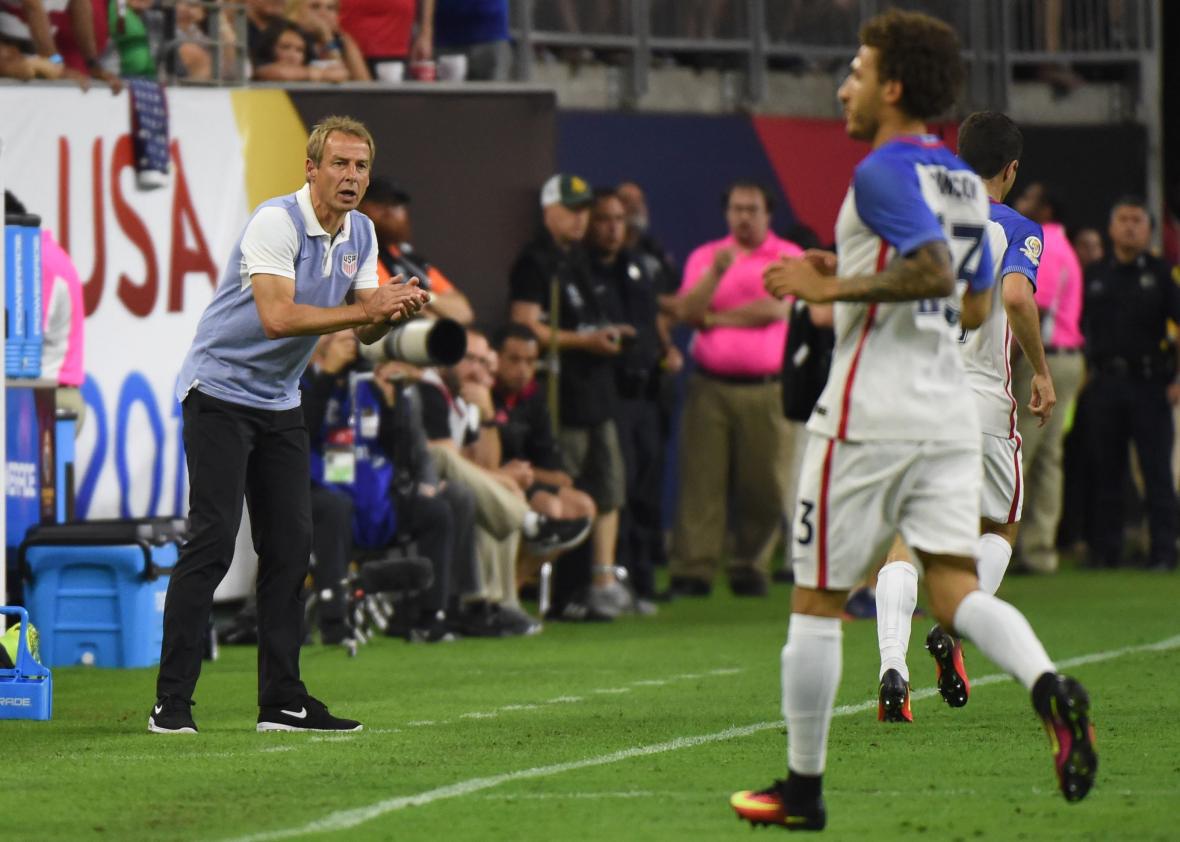From the start, the promise of Jurgen Klinsmann as manager of the U.S. men’s national team was revolution: gritty, plodding American soccer would give way to attacking flair; the parade of journeymen would end; an era of skilled stylists would begin. It was a grand project, a cultural transformation that would require bending the entirety of American soccer to his vision.
On a night of humiliating defeat, it’s especially easy to recount the obvious: Progress comes in increments. You need to beat Paraguay and Ecuador before taking down Argentina. The semi-finals of the Copa America was the most that could be reasonably expected of this squad, despite the advantage of hosting the affair. And there were satisfying spells of play over the course of the tournament, especially in the first half against Ecuador. But, in the end, it’s hard not to be a little frustrated with the pace of the progress.
Before the Copa, Klinsmann gave a tetchy, but revealing, interview to the Wall Street Journal. He moaned about the quality of the players he could select, especially the younger ones: “That talent is not there yet when it comes to the national team, when it gets to big tournaments, when it gets serious.” This is a fair assessment, but should never have been delivered in such self-exculpatory fashion. Klinsmann has a lot to do with the progress of unrealized American stars—he hypes the likes of Gedion Zelalem and Julian Green, yet relies on limited talents like Chris Wondolowski and Graham Zusi. There are players that he has successfully brought along, especially John Brooks and Bobby Wood.* Still, there are gripes with his approach—that he speaks in generalities and relies on motivational pablum, without providing the technical and tactical teachings to mold raw skill.
The limits of the national squad were plenty evident in this tournament. Aside from Clint Dempsey—who I would argue is the greatest American player ever—the team lacked another player capable of fabricating goals by dint of their own wits and skill. Or let’s start at the back: Brad Guzan is not young or very good either. Although Argentina would have thrashed the Americans under any circumstances, Guzan flopped around his box and distributed poorly. It’s disturbing that Tim Howard doesn’t have an adequate replacement waiting on the bench. Then let’s travel up the spine of the squad. Michael Bradley has the stuff of leadership; he works hard and can break up the opponent’s play. However, that’s not enough to justify his philanthropic attitude towards possession, the generous portion of balls that he contributes to his foes. His sloppiness constantly culminates in unnecessary goals. Sloppiness was, of course, the central motif of Tuesday night’s collective effort. And it looked especially appalling when set against the tidiness of Argentina’s tiki taka.
If Klinsmann were a master tactician, he could help paper over these weaknesses. But that’s never been his strength. Before Tuesday’s game, he gave interviews that reflected his muddled vision—he spoke both of muscling Argentina, implying that he might have his players sit back, and then boasted of taking the game to them. He never really did make up his mind. And I’m not sure he has the tactical capacity to organize his squad in a bus-parking formation, anyways. Several years into the Klinsmann experiment, the Americans are only marginally more fluid, a hint better in the attack. He remains more of a Tony Robbins preacher of empowerment than a Pep Guardiola thinker. The distant goal of a new paradigm remains, without any clear sense of how to prod his players there.
This all sounds a bit harsh—and the problem is that Klinsmann is stuck between the dreams of revolution and realities of meliorism. He wants to be a transformational manager, yet still seems most focused on delivering immediate results. The results can be pretty good, though sometimes one wonders if they’re any better than Bob Bradley or Bruce Arena might have achieved. But he’s set expectations high, and that’s the standard by which he should be judged. By that measure, he has fallen far short.
*Correction, June 22, 2016: This post originally misidentified Bobby Wood as Bobby Woods.
